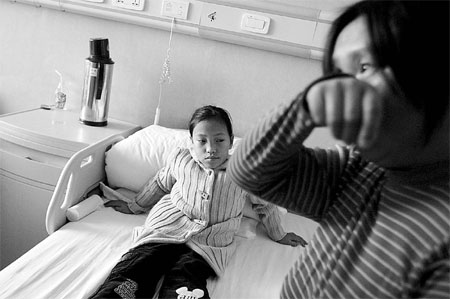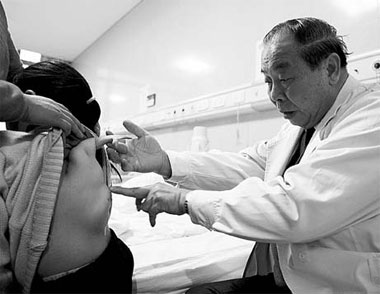Ren's fight to be normal
 |
| Ren Xin waits for surgery at the General Hospital of Armed Police Forces in Beijing. |
However, the daughter of a poor farmers' family has proved to be a clever and diligent student and always ranked among the best in her class.
Ren Xin lives in a remote mountainous region in North China's Shanxi Province. She is the second child in the family of three children. Her parents are both farmers who make a meager annual income of a few thousand yuan.
"I did not have any uncomfortable feelings when I was expecting. I also did not come into contact with any toxic substances while pregnant," says her mother Li Cuiping.
After a B-ultrasound examination when Li was in the eighth month of pregnancy, doctors suggested she should give birth in the hospital. But they did not tell her about her child's health conditions. However, the family's financial troubles made birthing in a hospital too expensive.
 |
|
Doctor examines Ren Xin's extra arm. File Photos |
After a difficult delivery, the mother found her daughter was deformed, first noticing the extra arm growing out of her back. Although they knew the newest addition to their family could become a tremendous burden, they decided to still bring her up.
Today, the youngster is becoming increasingly aware that she is different from other children. To avoid being stared at, she now wears thick clothing all of the time - even in the scorching summer.
Ren has never been able to sleep comfortably on her back. But her physical discomforts pale in comparison to her emotional strife. In order to avoid the discrimination of others, she shuts down and retreats to her own world.
"She does not like other people's attention or talking about her extra arm," says her mother, who accompanied Ren to seek medical assistance in Beijing.
During most of the wait in the General Hospital of Armed Police Forces, Ren is quiet. She rarely speaks to other patients in the same room. She kills time by reading the newspaper and playing cards with her mother.
The media have dubbed her: "The Girl With Wings".
Doctors determined the extra arm comes from a parasitic twin. Through a series of operations, they hope to redress the deformity and give the girl a chance at a normal life.
Medical checkups found the extra arm is not fully developed and includes a shoulder blade, a forearm and two fingers with nails.
Just beneath the parasitic arm protrudes a large lump that extends to her lower waist. From the lump, there grows a pair of underdeveloped breasts and also an orifice similar to an anus, from which yellow, sticky discharge flows constantly. The lump, the doctors guess, could hide a reproductive system.
Ren Xin is definitely not the first born with a parasitic twin, but she is among few.
According to professor Ye Qibin, head of the hospital's orthopaedics department, there are no more than 100 cases worldwide, and in China, the number should not exceed 20.
Parasitic twins occur when a twin embryo begins developing in the uterus, but one embryo ceases development owing to unknown reasons and parts of its body live on the healthy individual twin. The undeveloped twin is defined as parasitic, because it is incompletely formed and is dependent on the complete fetus to live.
The spine of the parasitic twin and Ren's three spinal columns are fused, which narrows the spinal tube and causes her physical deformity and withered muscles.
Also, a major blood vessel in the parasitic twin is connected to Ren's main organs and bone marrow.
"These would definitely add to the difficulties of operations," Ye says.
Now, a medical team headed by professor Ye has already designed a four-stage operation strategy, which might last a few months, involving doctors of different specialties, such as orthopaedists, neurosurgeons and plastic surgeons. The doctors would cut off the parasitic parts and correct her spinal curve.
However, Ren Xin also has a severe lung disorder.
To make sure she doesn't stop breathing during the operations, doctors require her to do breathing exercises using a ventilator.
In addition, she should climb the stairs for half an hour every day to increase her lung capacity.
The doctors are optimistic about the outcome of the operation and have scheduled the first stage for next week.
However, the family's hope is overshadowed by the potentially enormous medical bills, which are expected to be as much as 100,000 yuan ($13,510). The hospital has deducted part of the fee and is also seeking financial aid for the family.
(China Daily 11/29/2007 page20)














